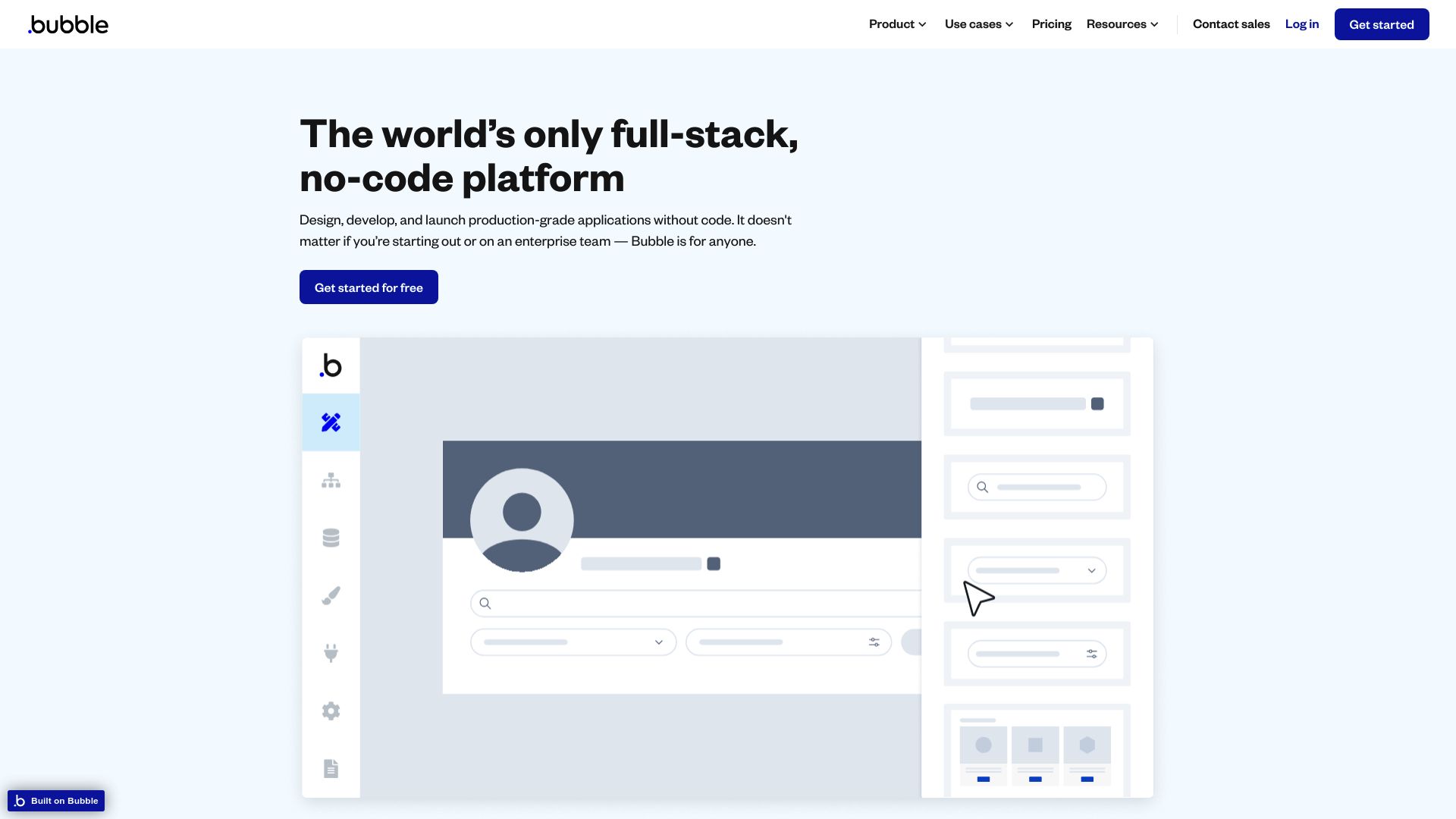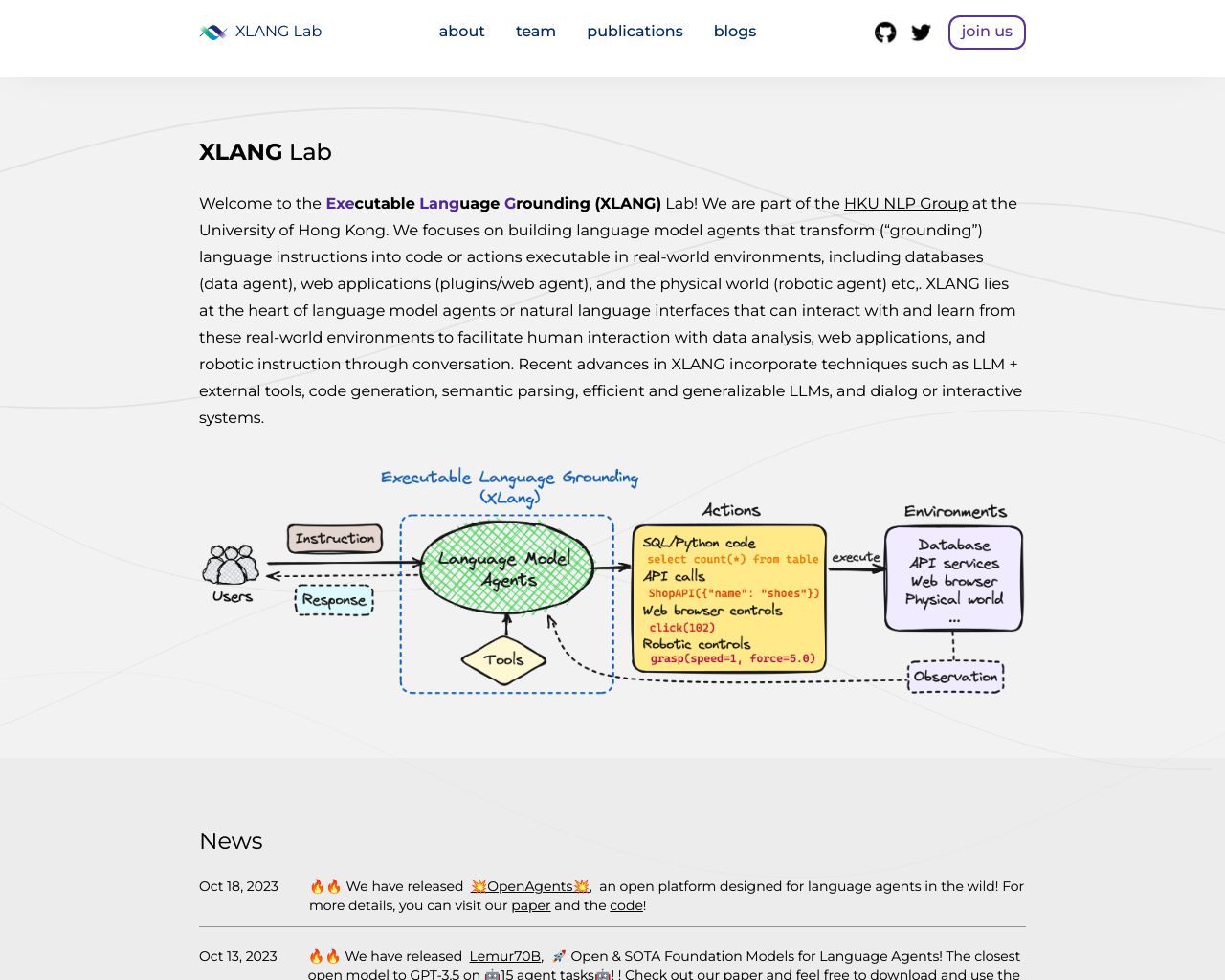Bubble vs. OpenAgents: Comparing AI Integration in App Development
AI tools reshape business landscapes daily, presenting both opportunities and challenges for organizations striving to harness this technology. Our comprehensive comparison of Bubble vs. OpenAgents, and SmythOS unveils the strengths and limitations of each platform in the realm of AI integration and application development. We explore how these tools empower users—from developers and business leaders to non-technical professionals and AI enthusiasts—to create AI-enhanced solutions. By examining key features, development approaches, and AI capabilities, this review equips readers with crucial insights to select the ideal platform for their specific needs, whether building complex web applications, leveraging specialized AI agents, or seeking a comprehensive AI development ecosystem.
Bubble Overview
Bubble empowers users to create web applications without coding. This visual development platform caters to entrepreneurs, small businesses, and enterprises seeking rapid application development.


Bubble’s drag-and-drop interface simplifies the creation of complex web applications. Users design layouts, define workflows, and manage databases through an intuitive visual editor. This approach democratizes web development, enabling non-technical users to bring their ideas to life.
Bubble’s drag-and-drop interface simplifies the creation of complex web applications… This approach democratizes web development, enabling non-technical users to bring their ideas to life.
The platform shines in its ability to integrate AI capabilities. Through plugins and API connectors, Bubble facilitates easy incorporation of AI tools like ChatGPT and GPT-4. This feature allows users to enhance their applications with chatbots, content generation, and image processing without deep AI expertise.
Bubble’s scalability, built on Amazon Web Services, ensures applications can grow with user demands. The platform offers robust security features, including GDPR compliance and SOC 2 Type II certification, making it suitable for enterprise-level applications.
While Bubble excels in no-code development, it lacks some advanced AI agent functionalities. The platform doesn’t offer hosted AI agents or autonomous agent capabilities, limiting its use for complex AI-driven tasks. However, its strength lies in enabling rapid development of AI-enhanced web applications accessible to a broad range of users.
OpenAgents Overview
OpenAgents introduces a versatile platform integrating voice agents into daily life. The system revolves around three primary agents: Data Agent, Plugins Agent, and Web Agent. Each serves distinct purposes, from data analysis to task automation and web browsing.


The Data Agent excels in processing large datasets, generating insights crucial for roles like marketing. The Plugins Agent boasts over 200 integrated plugins, offering unparalleled versatility for everyday tasks. The Web Agent, equipped with a Chrome extension, streamlines internet navigation through autonomous browsing.
OpenAgents emphasizes user-friendliness with a web UI and backend server, making agent communication accessible to non-experts.
OpenAgents emphasizes user-friendliness with a web UI and backend server, making agent communication accessible to non-experts. The platform ships with backend code for hosting agents, a frontend UI, and the Chrome extension. It supports deployment on localhost and allows integration of new agents and plugins.
While OpenAgents offers impressive capabilities, it lacks some features found in more comprehensive platforms. The system doesn’t provide hosted agents for development or production, autonomous agents, or multi-agent collaboration. It also lacks specific features for constrained alignment, IP control, and data lakes.
OpenAgents aims to bridge the gap between expert and non-expert users, providing practical AI solutions for real-world challenges. The platform’s focus on accessibility and everyday utility sets it apart in the AI agent landscape, though users requiring more advanced features may need to look elsewhere.
Feature Comparison
Bubble and OpenAgents offer distinct approaches to AI integration and application development, each with its own strengths and limitations. Bubble excels in no-code web application development with AI integration capabilities, while OpenAgents focuses on specialized AI agents for specific tasks.
Bubble’s visual builder and no-code editor empower users to create complex web applications without coding expertise. Its integration with AI services like OpenAI’s GPT models allows for AI-enhanced functionalities. However, Bubble lacks native AI agent capabilities, autonomous agents, and multi-agent collaboration features. It also doesn’t offer hosted vector databases or advanced AI-specific features like constrained alignment.
OpenAgents, on the other hand, provides three specialized agents — Data Agent, Plugins Agent, and Web Agent — each designed for specific tasks like data analysis, task automation, and web browsing. While OpenAgents offers impressive AI agent capabilities, it lacks the comprehensive web application development features of Bubble. OpenAgents doesn’t provide a visual builder or no-code editor for creating full-fledged web applications.
Both platforms have gaps in core AI agent functionalities compared to more specialized solutions. Neither offers hosted agents for development and production, autonomous agents, or multi-agent collaboration. They also lack advanced security features like constrained alignment and IP control. These limitations may impact users requiring more sophisticated AI agent capabilities or enterprise-level security measures.
Feature Comparison Table
| Bubble | OpenAgents | SmythOS | |
|---|---|---|---|
| CORE FEATURES | |||
| Visual Builder | ✅ | ❌ | ✅ |
| No-Code Options | ✅ | ❌ | ✅ |
| Memory & Context | ❌ | ✅ | ✅ |
| Autonomous Agents | ❌ | ✅ | ✅ |
| Explainability & Transparency | ❌ | ✅ | ✅ |
| Multimodal | ❌ | ✅ | ✅ |
| Multi-Agent Collaboration | ❌ | ✅ | ✅ |
| Bulk Work | ❌ | ✅ | ✅ |
| Agent Work Scheduler | ❌ | ❌ | ✅ |
| SECURITY | |||
| Constrained Alignment | ❌ | ❌ | ✅ |
| IP Control | ❌ | ❌ | ✅ |
| COMPONENTS | |||
| Huggingface AIs | ❌ | ✅ | ✅ |
| Classifiers | ❌ | ✅ | ✅ |
| Data Lakes | ✅ | ❌ | ✅ |
| DEPLOYMENT OPTIONS (EMBODIMENTS) | |||
| Deploy as API | ❌ | ✅ | ✅ |
| Staging Domains | ✅ | ❌ | ✅ |
| Production Domains | ✅ | ❌ | ✅ |
| Deploy as Scheduled Agent | ❌ | ❌ | ✅ |
| DATA LAKE SUPPORT | |||
| Hosted Vector Database | ❌ | ❌ | ✅ |
| Sitemap Crawler | ❌ | ❌ | ✅ |
| YouTube Transcript Crawler | ❌ | ❌ | ✅ |
| URL Crawler | ❌ | ✅ | ✅ |
Best Alternative to Bubble and OpenAgents
SmythOS stands out as the superior alternative to Bubble and OpenAgents, offering a comprehensive platform for AI agent development and deployment. We combine the best of both worlds: the ease of use of a no-code platform with the power and flexibility of advanced AI capabilities.
Our visual builder and no-code options empower users of all skill levels to create sophisticated AI agents without extensive programming knowledge. Unlike Bubble, which focuses primarily on web application development, or OpenAgents with its limited set of specialized agents, SmythOS provides a versatile environment for building and deploying a wide range of AI solutions.
SmythOS provides a versatile environment for building and deploying a wide range of AI solutions.
We offer unparalleled flexibility in deployment options. Users can deploy their agents as APIs, webhooks, scheduled tasks, or integrate them directly into websites as chatbots. This versatility allows for seamless integration into existing workflows and systems, addressing a broader range of use cases than either Bubble or OpenAgents.
SmythOS excels in scalability and performance, crucial factors for growing businesses. Our platform supports enterprise-level deployments with features like staging and production environments, data encryption, and IP control. These capabilities ensure that your AI solutions can grow with your business needs, something not readily available in Bubble or OpenAgents.
With SmythOS, you’re not limited to a single type of AI or a narrow set of functionalities. Our platform supports multimodal interactions, autonomous agents, and multi-agent collaboration, pushing the boundaries of what’s possible with AI. Whether you’re building a simple chatbot or a complex, data-driven decision-making system, SmythOS provides the tools and capabilities to bring your vision to life.
Conclusion
Bubble and OpenAgents offer unique approaches to AI integration and application development, each with distinct strengths. Bubble excels in no-code web application creation with AI enhancements, while OpenAgents focuses on specialized AI agents for specific tasks. However, both platforms have limitations in advanced AI agent functionalities.
SmythOS emerges as the superior choice, offering a comprehensive solution that addresses the limitations of both Bubble and OpenAgents. Our platform provides hosted agents for development and production, autonomous agents, and multi-agent collaboration capabilities. SmythOS’s drag-and-drop interface and no-code editor rival Bubble’s ease of use, while our extensive AI integration ecosystem surpasses OpenAgents’ plugin offerings.
Unlike Bubble and OpenAgents, SmythOS offers advanced features such as constrained alignment, IP control, and data lake support. We provide a versatile deployment system, allowing users to create agents once and deploy them across various platforms, including as APIs, chatbots, or scheduled tasks. This flexibility, combined with our robust security measures and scalability, makes SmythOS ideal for businesses of all sizes.
If you’re looking to harness the full potential of AI in your projects, explore our diverse range of AI-powered agent templates to kickstart your journey. Ready to experience the future of AI development? Create a free SmythOS account today and join the AI revolution. With our 30-day money-back guarantee, you can try SmythOS risk-free and discover how our platform can transform your workflow and drive innovation in your industry.
Last updated:
Disclaimer: The information presented in this article is for general informational purposes only and is provided as is. While we strive to keep the content up-to-date and accurate, we make no representations or warranties of any kind, express or implied, about the completeness, accuracy, reliability, suitability, or availability of the information contained in this article.
Any reliance you place on such information is strictly at your own risk. We reserve the right to make additions, deletions, or modifications to the contents of this article at any time without prior notice.
In no event will we be liable for any loss or damage including without limitation, indirect or consequential loss or damage, or any loss or damage whatsoever arising from loss of data, profits, or any other loss not specified herein arising out of, or in connection with, the use of this article.
Despite our best efforts, this article may contain oversights, errors, or omissions. If you notice any inaccuracies or have concerns about the content, please report them through our content feedback form. Your input helps us maintain the quality and reliability of our information.
